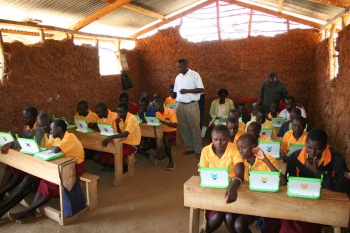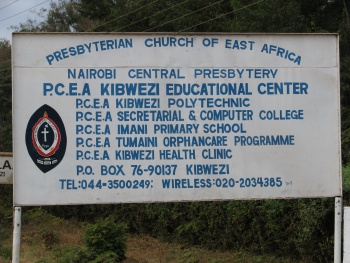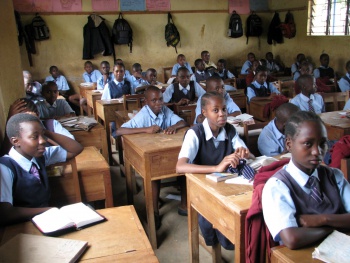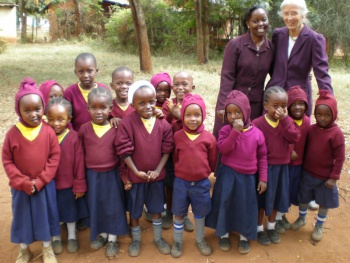OLPC Kenya
OLPC Kenya includes a number of small deployment communities: Asilong in West Pokot, three OLPCorps projects (Kibwezi, Mombasa-North, and Nairobi), and an east-coast project near Lamu. In all, there are some 500 children in 5 schools in Kenya learning with XOs.
Map & Blogs
All OLPC-related Kenya projects are strongly encouraged to post onto olpcMAP.net, which is OLPC's global community map of all projects large and small -- helping volunteers, local champions and schools to connect directly! Here are some great example community blogs from olpcMAP:
http://www.ntugischool.com
http://olpcinbura.blogspot.com
http://olpckibwezi.blogspot.com
http://educateruralchild.wordpress.com
Asilong Primary School, West Pokot
Asilong is a small village about 10 km beyond Kacheliba in the arid region of West Pokot. 100 XO laptops were deployed there in July of 2009 and are charged using solar power as there is no electricity in the village yet. For the first year of usage, the students had no school server, so they spent their time learning the XO hardware and the pre-loaded activities. In November 2010 the XOs were updated to the latest operating system and an XS server was installed. The students are now using a public library on the server to access current information and educational material that is loaded by the school's headmaster, Joachim Krop, and IT manager, Julius Sawe. Through the library they also have access to audio files in their native language of Pokoot, as well as educational animations.
In March, additional local content in line with the Kenyan standard educational course material will be added using Moodle. Online quizzes will be available to aid the students in preparing for national exams. Asilong has been highlighted in several articles in national newspapers as they are moving ahead in e-learning despite their remote location. For more information contact: asilong.olpc@gmail.com
OLPCorps Kibwezi 2008
full article: see OLPCorps Kibwezi
Kibwezi is a small rural town located in the arid region of Kenya, about half-way between the capital of Nairobi and the coastal city of Mombassa. Many of the students come from the surrounding farms. Their families survive on subsistence agriculture and many do not have electricity or running water in their homes. The access to laptop computers stirs emotions of pure joy inside of the children. Last year some teachers took the computers home and took home videos of their families and church choirs and with the record program.
Our team is composed of 22 Americans from Burke Presbyterian Church partnered with the Imani Primary School at the Kibwezi Educational Centre, in Kibwezi Kenya. Our group has already made personal commitments to pay for ourselves to return to Kenya in July 2009. We are scheduled to arrive on July 3rd and leave July 27th. During that time, we break into small teams and learn from our Kenyan teachers how they faired over the past year with the OLPCs. We are taking fresh faces this year; five members of the team are enrolled in university level classes at the following schools: VA Tech, James Madison University, Radford University, Bucknell University, and Northern Virginia Community College.
This will be our second deployment of OLPC computers to the primary school. Last year we purchased six OLPCs through the Give-One-Get-One (G1G1) program. This year we have already purchased four OLPC computers, two new OLPCs through G1G1 and two used OLPCs through Ebay; in addition we have adapted "Sugar on a Stick" to train team members who do not have the original hardware. Our focus this year is developing a curriculum which fits into Kenya's focus on standardized testing. We have two former teachers training with the Laptops via a tutoring program located in Burke Presbyterian Church. This practical experience paired with guidance via email communication with the director of the Imani Primary school will prepare us for our second deployment.
About the Partner School
The campus of the Kibwezi Educational Centre contains a primary school and preschool exist for grades one though eight. There are approximately 400 hundred students in the primary school. These students range in age from 6 to 12 years old.
Diane Reimers with kindergarten age students.

Three Kenyan teachers from the Imani primary school in Kibwezi, Kenya teach OLPC to their students
Several strengths of the OLPC deployment to the Kibwezi educational Centre include:
1) A twenty-one year history between Burke Presbyterian Church and the Local Presbyterian Church of East Africa, to include the Educational Centre and the Inmani Primary school, which we help fund.
2) As for the budget, we are self sufficient for the trip to Kenya. OLPC is "bonusing" off of costs already covered by Burke Presbyterian Church, to included thousands in travel expenses, OLPC shipping, and the salaries of the local Kenyan teachers. When awarded 100 OLPC laptops by OLPC Africa Corps, church members carry 5 OLPCs each, thus providing a guarantee that the computers arrive safely at their intended destination.
Cell tower in Kibwezi, used for access to internet service.
3) A demonstrated commitment to learning at the local level in the United States. Both by attending meetings of the OLPC Learning Club - DC (the largest such club in the world) and by tutoring American students year-round with OLPC computers (started in November 2008). It is planned that Greg Gates, will teach Kenyan curriculum using OLPCs based on the OLPCorps Learning Guide.

Eric Fisher practicing on an OLPC computer. Eric is a high school senior going to Kenya in July 2009.
2008 groundwork
Points of Contact(POCs) in the United States:
Greg Gates, Student Leader, Sophmore at Virginia Tech
















